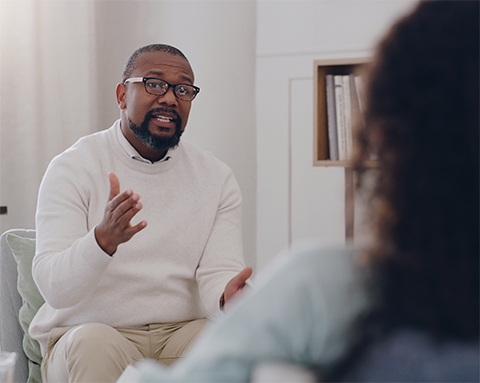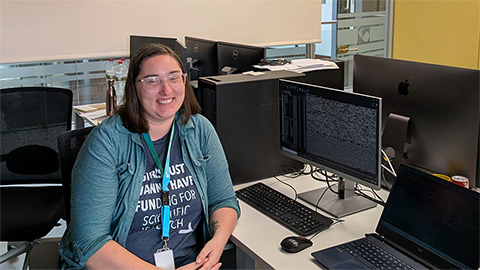
Fostering mental health in faculty and students
When you lose a loved one, people often say, “It gets better.” It’s been nearly 14 years since I lost my brother, David, to suicide. I don’t know if I can say it gets better, but it does get easier.
That day in June of 2010 profoundly changed my life. In the years since, I’ve graduated high school, earned bachelor’s and master’s degrees, and recently completed my Ph.D. in ecological-community psychology at Michigan State University. Beyond this academic achievement, however, my doctoral degree represents a culmination of loss, grief, healing and resilience.

More than that, my degree represents a convergence of identities. Who I am as a suicide loss survivor and who I am as a professional inform one another. My experiences around mental health and suicide loss add authenticity to my work, and my work in turn gives purpose to my grief. Professionally, I describe my work as turning research and data into action to create change. Personally, this work has allowed me to transform loss into action to save lives.
Mental health and wellness in graduate school
Through this work, I’ve also learned a lot about how to help those who might be struggling. A key part of that is raising awareness about suicide and its prevention. Particularly in graduate education, both faculty and students face a lot of pressure. The nature of science often requires failed experiments and competing deadlines, on top of the financial stressors and our personal lives.
In recent years, several articles have been written about the mental health of graduate students in the U.S. For example, in one meta-analysis, authors found that 24% of Ph.D. students exhibited clinically significant symptoms of depression while 17% exhibited symptoms of anxiety, suggesting significantly higher rates of these symptoms among Ph.D. students compared to other young adults. These challenges can be especially salient for first-generation and minoritized students who often feel isolated and may experience toxic or harmful work environments.
Supporting someone you are worried about
All this information can seem overwhelming. The good news is that there are steps all of us can take to ensure we and those around us are prioritizing wellness and looking out for one another.
Know the risk factors. These characteristics or conditions that increase the chance that a person may try to take their own life, in general, fall into three categories: health, environmental and historical. Examples of potential risk factors are chronic physical and mental health conditions, substance use issues, prolonged stress at home or at work, stressful life events and historical trauma or abuse.
Look out for warning signs. Things to look out for when you are concerned that a person may be at risk for suicide are typically exhibited in a person’s talk, behavior and mood. For example, someone may talk about feeling like a burden to others, they may give away prized possessions or withdraw from activities they typically enjoy, or they may be irritable or depressed more than usual. There is no certain combination of risk factors or warning signs over a certain period to look out for. Rather, it is important to trust your gut and, if you’re concerned about someone, reach out and have a conversation.
Reach out. If you’re concerned about someone, have a real, honest conversation with that person. Talk to them in private. Have a conversation after class or during office hours, or maybe grab a coffee. Transparency is important for building trust, so let a student or colleague know if you’re a mandated reporter for your university or college. Next, listen to their story without judgment and let them know you care about them. Simply saying, “Hey, I’ve noticed you’ve been less engaged in class lately and I’m concerned. How are you doing?” can be incredibly powerful and affirming. If you are concerned that they may be suicidal, ask directly if they are thinking about suicide. This can be a challenging question to ask, but it lets them know that you’ve noticed, that you care and that you’re a safe person to talk to about it. Research shows that asking directly about suicide does not increase the risk but actually provides relief for someone who may be struggling.
Connect them to resources. If they need additional support, encourage them to seek treatment or contact their doctor or therapist, or university resources. In this conversation, your role is not to fix the situation but to be there to listen, and to offer support and resources. If the person has said they’re considering suicide, take them seriously, stay with them and call the 988 Suicide and Crisis Lifeline or text TALK to 741-741 to reach the Crisis Text Line. Both lines are answered by trained professionals who can guide a caller through the necessary steps.
Prevention and wellness resources
For those not in immediate crisis, when connecting students or colleagues to resources, a great place to start is on your own campus. Use campus resources such as counseling and psychological services centers, health center deans and academic advisors. Many campuses also have student organizations (such as JED Campus) that help build community and foster mental health. You can also bring a program to campus (such as It’s Real: College Students and Mental Health) or share mental health campaign messages (such as videos and resources from the Seize the Awkward campaign).
Another resource is the American Foundation for Suicide Prevention’s Interactive Screening Program, or ISP, available for colleges and universities. ISP’s customized platform provides a safe and confidential way to take a brief screening for stress, depression and other mental health conditions, and receive a personal response from a program counselor within available mental health services.
If you or someone you know is in crisis, call the Suicide & Crisis Lifeline at 988 or text the Crisis Text Line at 741-741.
Conclusion
In my own life, the personal and the professional have merged to create a fulfilling and purposeful career focused on using science to create change and save lives.
We go into academia to make a difference — to use our knowledge and skills to contribute to science and build a better society. To do that effectively, we must prioritize our own well-being and that of our colleagues and students. By supporting those around us and leading with kindness, we can lead with our humanity in that pursuit and, in so doing, create better science.
The good news is that there are steps all of us can take to ensure we and those around us are prioritizing wellness and looking out for one another.
Supporting graduate students
Here are five simple strategies faculty members can all use to support and affirm grad students and foster wellness:
- Support a culture of collaboration over competition: Encourage grad students to separate their work from their own self-worth and model effective strategies for managing imposter syndrome that is manifested by doubting one’s skills or accomplishments despite success, or an internalized fear of being exposed as a fraud. In turn, this encourages us to celebrate others’ successes rather than viewing them as personal failures.
- Model work–life balance: Encourage boundary setting, establish reasonable time off and leave policies, be thoughtful about familial and caregiving obligations, and actively encourage students to take time off periodically.
- Frame and handle rejection constructively: Teach strategies such as having a support network, regular physical activity, returning to and reaffirming their own beliefs and values, and continuous self-reflection. This also includes offering constructive criticism and thoughtful suggestions for improvement. For manuscript rejections, this might include outlining a process for reading feedback, taking a couple of days to process feelings and reactions, and then developing a step-by-step plan for tackling the recommendations.
- Encourage inquiry: Foster an environment in which students feel comfortable asking questions or seeking advice or support when needed. Creating open lines of communication can help students feel seen and heard.
- Lead with kindness: In mentorship, in peer review and in day-to-day interactions, kindness goes a long way, and modeling this can be impactful for students. Our goal in this work is to collaborate on worthy contributions to scientific literature, and we hope to improve society in the process.
Enjoy reading ASBMB Today?
Become a member to receive the print edition four times a year and the digital edition monthly.
Learn moreGet the latest from ASBMB Today
Enter your email address, and we’ll send you a weekly email with recent articles, interviews and more.
Latest in Opinions
Opinions highlights or most popular articles

Women’s health cannot leave rare diseases behind
A physician living with lymphangioleiomyomatosis and a basic scientist explain why patient-driven, trial-ready research is essential to turning momentum into meaningful progress.

Making my spicy brain work for me
Researcher Reid Blanchett reflects on her journey navigating mental health struggles through graduate school. She found a new path in bioinformatics, proving that science can be flexible, forgiving and full of second chances.

The tortoise wins: How slowing down saved my Ph.D.
Graduate student Amy Bounds reflects on how slowing down in the lab not only improved her relationship with work but also made her a more productive scientist.

How pediatric cataracts shaped my scientific journey
Undergraduate student Grace Jones shares how she transformed her childhood cataract diagnosis into a scientific purpose. She explores how biochemistry can bring a clearer vision to others, and how personal history can shape discovery.

Debugging my code and teaching with ChatGPT
AI tools like ChatGPT have changed the way an assistant professor teaches and does research. But, he asserts that real growth still comes from struggle, and educators must help students use AI wisely — as scaffolds, not shortcuts.

AI in the lab: The power of smarter questions
An assistant professor discusses AI's evolution from a buzzword to a trusted research partner. It helps streamline reviews, troubleshoot code, save time and spark ideas, but its success relies on combining AI with expertise and critical thinking.

